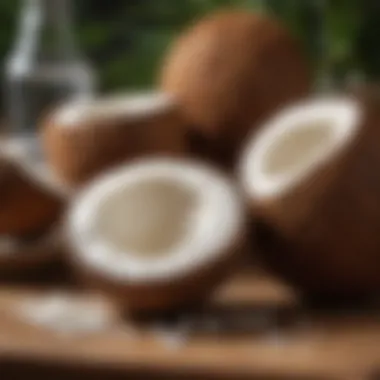Exploring the Diverse World of Coconut Beverages


Intro
The exploration of coconut beverages presents a fascinating journey involving tradition, health, and taste. It ties together various cultures and culinary practices around the globe. This article addresses the diverse nature of these drinks, their roots, and their modern interpretations. By understanding the ingredients, preparation, and potential health benefits, readers can appreciate the richness of these beverages.
Ingredients Breakdown
When discussing coconut beverages, it is essential to grasp the fundamental components that give these drinks their unique character. The vast array of coconut beverages varies widely, yet there are core elements that most commonly feature.
Primary Ingredients
- Coconut Water: This hydrated fluid from green coconuts is both refreshing and hydrating. It contains vital electrolytes and is low in calories.
- Coconut Milk: Made from grated coconut flesh and water, this ingredient adds richness to beverages of all kinds.
- Coconut Cream: Slightly thicker than coconut milk, it renders a more intense coconut flavor and creaminess.
- Sugar and Sweeteners: Natural sweeteners such as agave syrup or cane sugar help balance the beverage’s taste.
- Flavorings: Ingredients like vanilla, spices, or fruit extracts add depth to the drink.
Optional Ingredients
- Herbs and Spices: Mint, lemongrass, ginger emerg as common additional flavors.
- Zest or Juices: Lime or lemon zest can offer an acidic contrast, making the beverage more vibrant.
- Other Plant Milks: Almond or soy milks can be blended with coconut-based drinks for an unusual twist.
Essential Kitchen Tools
- Blender: An essential tool for mixing ingredients into a smooth consistency.
- Strainer: Useful when making coconut milk or ensuring a lump-free beverage.
- Measuring Cups and Spoons: Important for consistency especially when trying out different recipes.
Step-by-Step Preparation
Concocting characteristic coconut beverages necessitates a methodical approach. Here’s how to prepare them effectively.
Prepping the Ingredients
Using fresh ingredients tends to enhance flavor.
- Extract Coconut Water: Open a young coconut, or buy prepared coconut water from the store.
- Grate Coconut Flesh: If making milk, shred the meat from a brown coconut.
- Measure Flavors: Have herbs and spices ready, as they must be incorporated swiftly.
Cooking Techniques and Methods
- Making Coconut Milk: Blend shredded fresh coconut with water, then strain using a cheesecloth.
- Blending Components: Mix coconut water, milk, sweeteners, and flavorings in a high-speed blender until combined.
Assembly and Presentation Tips
Present the finished drink in a chilled glass. Garnishing with a piece of coconut or a sprig of mint can elevate visual appeal. Serve fresh for the best experience.
Dietary Considerations
Coconut beverages can align with multiple dietary preferences, making them versatile.
Gluten-Free Options
Coconut naturally contains no gluten, making coconut water and milk safe for those with gluten intolerances.
Vegetarian and Vegan Substitutes
Most coconut beverages are inherently vegan. Cacao or vanilla varieties offer additional plant-based alternatives that appeal to animal-product free diets.
Nutrition Facts & Nutritional Considerations
Coconut water stands out for its low-caloric content. Coconut milk, in contrast, is rich in healthy fats and calories. Nutrients may also vary based on additional sweeteners and flavorings used.
Variations and Customizations
The versatility of coconut beverages encourages culinary creativity.
Flavor Enhancements
Experimenting can lead to ingenious flavoar combinations, such as adding pineapple for a tropical twist.
Alternative Cooking Methods
Fermenting coconut water can yield a probiotic-rich drink that enhances gut health.


Pairing Suggestions (Sides, Drinks, etc.
)
Ideal pairings may include tropical fruits or light snacks that avoid overpowering the subtle nuances of coconut flavors.
Common Answers to Common Questionss and Troubleshooting
Frequently Asked Questions
Why do coconut beverages differ in taste? The taste may differ based on freshness and preparation methods used.
Common Mistakes to Avoid
- Using processed coconut products rather than fresh ones can lead to significantly different health benefits and flavors.
Solutions to Potential Problems
If drinks appear too thick, simply mix in additional coconut water or plant milk until reaching the desired constancy.
Coconut beverages not only demonstrate refreshing qualities, but they also support diverse nutritional needs in all ages.
Intro to Coconut Beverages
Coconut beverages have gained popularity in recent years, reflecting a growing interest in health and wellness among consumers. These drinks not only play a key role in hydration but also offer nutrional benefits that can enhance various dietary preferences. Examining coconut beverages allows us to understand their versatility in culinary practices and their cultural importance across the globe. The broad range of choices, from refreshing coconut water to creamy coconut milk, caters to diverse tastes and preferences, making them accessible for food lovers of all ages.
Defining Coconut Beverages
Coconut beverages refer to drinks and liquids derived from coconuts, emphasizing their refreshing and nutritious properties. This category prominently includes coconut water, coconut milk, coconut cream, and plant-based yogurts. These drinks vary in terms of fat content, texture, and uses in cooking or drinking. Coconut water, for instance, is primarily celebrated for its hydration properties. In contrast, coconut milk is cherished for its rich flavor and culinary flexibility. Likewise, coconut cream is known for its thick, luscious texture that enhances desserts and savory dishes alike. Each beverage brings unique characteristics to the table, enriching our palates and expanding our culinary horizons.
Historical Context
The journey of coconut beverages can be traced back thousands of years, resonating deeply within various cultural practices. Indigenous populations in tropical regions have relied on coconuts for sustenance, with their drinks evolving over the years. Coconut water, often branded the elixir of life, has been revered for its health benefits since ancient times. It formed a central part of rituals and celebrations in many societies, from India to the Caribbean.
In addition, coconut milk has been integrated into local cuisines for centuries, especially in South and Southeast Asian regions. Traditional recipes often feature coconut milk in dishes ranging from curries to desserts, illustrating its culinary significance. As globalization increases, coconut beverages are ingeniously incorporated into trending health-focused diets, extending their legacy into our modern culinary landscape.
Understanding the historical significance of coconut beverages contributes to acknowledging their evolving role in our diets today, highlighting both cultural continuity and change.
Types of Coconut Beverages
Coconut beverages vary in taste, texture, and function, each presenting unique qualities for different culinary contexts. Understanding the types of coconut beverages expands our knowledge about not just hydration options but also cooking and baking versatility. Palm crops are environmental resources, and knowing how to consume them sustainably reflects growing ecological awareness among consumers.
Coconut Water
Coconut water is the clear liquid found inside young green coconuts. It is filled with electrolytes, making it a popular choice for hydration. Many sports drinks tout similar benefits, yet coconut water stands out as a natural alternative due to minimal processing. The taste is subtly sweet and refreshing, appealing to those looking for both flavor and function.
Coconut water is considered rich in potassium, aiding in muscle recovery and hydration.
In terms of health, it is low in calories and contains no fat, which attracts calorie-conscious individuals. The presence of lauric acid also gives it antimicrobial properties. Coconut water has become common as a post-workout beverage and an ingredient in smoothies.
Coconut Milk
Coconut milk differs significantly from coconut water, as it is a product derived from pressing the grated meat of matured coconuts. This beverage has a rich, creamy consistency and is a staple in numerous cuisines worldwide, particularly in Asian dishes.
Coconut milk serves as a dairy-free substitute in many recipes. Its high-fat content provides a creamy texture to soups, curries, and desserts. The mixture also adds depth to smoothies and coffee drinks without the lactose found in cow's milk.
Nutritionally, it contains healthy fats, especially medium-chain triglycerides (MCTs), which have been linked to numerous health benefits, including improved heart health and weight management.
Coconut Cream
Coconut cream, like coconut milk, falls in derivatives derived from the coconut meat. It has a thicker consistency and is higher in fat than coconut milk. To make coconut cream, the extracted fat from coconut milk is left to further concentrate, integrating rich flavor.
Coconut cream finds its footing in desserts and culinary topping applications. It's great in puddings, ice creams, and whipped
Nutritional Benefits


Coconut beverages offer a wide array of nutritional benefits that are crucial for individuals seeking healthier alternatives to conventional drinks. They are more than just a refreshing option; they provide essential nutrients that contribute to overall well-being. This section outlines key components of nutritional value, underscoring how coconut beverages can be a valuable addition to one’s diet.
Hydration and Electrolytes
Coconut water stands out for its ability to hydrate effectively. It contains a unique blend of electrolytes such as potassium, sodium, and magnesium, making it an excellent choice for those needing replenishment after exercise or in hot climates. The naturally occurring sugars in coconut water also provide a quick source of energy without the drawbacks associated with many sports drinks.
Drinking coconut water can enhance endurance and aid recovery because of its electrolyte content. Additionally, it is lower in calories than traditional energy drinks and juices, benefiting those seeking to maintain or reduce their calorie intake. As a source of hydration, it combats ailments associated with dehydration, like fatigue and muscle cramps. In summary, swapping sugary beverages for coconut water may lead to better hydration and improved health outcomes.
"Coconut water is one of the best natural drinks for hydration, especially under extreme conditions."
Healthy Fats and Fiber
Coconut beverages also provide healthy fats, particularly in the forms of coconut milk and cream. These blends are rich in medium-chain triglycerides (MCTs). MCTs are known for providing quick energy as they metabolize rapidly compared to other fats. The fats in coconut products can help in satiety, potentially reducing overall intake during meals due to increased feelings of fullness.
Additionally, coconut beverages contain dietary fiber, particularly in the form of coconut yogurt and thicker coconut milk. Fiber is essential for gut health, promoting digestion and preventing gastrointestinal issues. Furthermore, dietary fiber plays a role in stabilizing blood sugar levels. Incorporating coconut-based options into diets can be an excellent strategy for those reshaping their eating habits.
Vitamins and Minerals
Coconut beverages are loaded with vitamins and minerals that support various bodily functions. For instance, coconut milk is a good source of vitamin C, B vitamins, and folate. These vitamins assist in boosting the immune system, promoting energy metabolism, and enhancing cognitive function.
Moreover, the mineral content is notable. Coconut products typically contain selenium, manganese, and copper, all of which play roles in antioxidant defense and energy production. Manganese, in particular, is crucial for bone health and helps the body process cholesterol and carbohydrates effectively.
Incorporating coconut beverages rich in vitamins and minerals fortifies the diet, encouraging a more balanced nutritional profile. Their multifaceted benefits highlight their place in modern diets as versatile and nutritious options.
Culinary Applications
Culinary applications of coconut beverages are crucial for understanding how these versatile ingredients can be integrated in a variety of dishes and drinks. This section explores the ways coconut products enhance flavor, texture, and nutritional value in global cuisines. Not only do they contribute to richness in recipes, but they also cater to a growing interest in plant-based and health-conscious eating habits. As food lovers explore these coconut beverages, they discover new taste experiences that can enrich their culinary palette.
Beverage Recipes
Coconut beverages serve as an excellent base for numerous drink recipes. From refreshing smoothies to unique cocktails, there are countless ways to use coconut water, milk, and cream. Here are a few notable examples:
- Coconut Mojito: Mix coconut water with mint, lime, and rum for a tropical twist.
- Tropical Smoothie: Blend coconut milk with pineapple, banana, and a handful of spinach for a nutrient-packed beverage.
- Choco-Coconut Shake: Combine coconut cream, cocoa powder, and milk for a decadent dessert drink.
These recipes not only offer delightful flavors but also maximize the benefits that coconut beverages provide.
Cooking with Coconut Milk
Coconut milk is often used in cooking due to its creamy texture and flavor that can complement a wide range of dishes. It is commonly found in several cuisines, especially in Southeast Asia. Key aspects to consider include:
- Curries: Many regional dishes, such as Thai red curry and Malaysian laksa, utilize coconut milk as a base, bringing nothing but a deeper richness.
- Soups: Coconut milk adds depth to soups. Try it in a broccoli-coconut soup for an interesting combination of flavors.
- Savory stews: Because of its rich thickness, coconut milk works wonders in stew-making, binding flavors together effortlessly.
When using coconut milk, it is important to choose the right variety—full-fat for creaminess and light for a healthier option. This adaptation provides flexibility in food preparation to align with dietary preferences.
Baking with Coconut Cream
Coconut cream delivers an elevated richness, making it an exceptional choice for baking. It is beneficial in both sweet and savory applications. Consider these factors:
- Cakes and Pastries: Incorporate coconut cream into frosting or batter to create moist, tropical-flavored sweets.
- Pies: A key ingredient in many coconut cream pies, it yields a luscious texture that enhances every bite.
- Dairy Alternatives: For those avoiding dairy, using coconut cream in recipes like vegan cheesecakes is a popular option and demands less compromise in taste.
To bake efficiently with coconut cream, ensure it is well-blended to achieve an even consistency in recipes. Its readiness to blend harmoniously with other flavors makes it a preferred ingredient in many cooking journeys.
Coconut beverages can redefine culinary experiences. Exploring their applications reveals not just delicious recipes, but also a gateway to healthier, richer foods.
Cultural Significance
Coconut beverages hold a cherished place in the culinary landscape across many cultures. Their importance goes beyond mere consumption; they reflect various traditions, festivals, and community practices. This section reveals how coconut drinks embody heritage, serve as kinship connections, and play integral roles in regional economies. The diverse consumption methods of these beverages highlight not just preferences, but also cultural dedication toward a resource that has been invaluable historically and socially.
Coconut Beverages in Asian Cuisine
Asian societies have a rich tapestry of coconut beverage background. Regionally, these drinks are crafted using coconut water, milk, and cream in ways that reflect local tastes and traditions. For example, in Thailand, coconut water is enjoyed straight from the fruit, celebrated for its refreshing quality. In contrast, Malaysia features sweetened coconut milk in its various desserts, such as cendol, which illustrates the utility of coconut in both beverages and dishes.
Great importance is also placed on coconut milk within curries across India, highlighting its smooth texture and ability to enrich flavors. This versatility makes it ideal for a wide range of culinary applications. Additionally, coconut drinks often join festivities and celebrations, guiding cultural practices.
Coconut beverages offer celebration during festivals, emphasizing social bonds and community gatherings.


Coconut Beverages in Caribbean Culture
In Caribbean countries, coconut beverages symbolize not only sustenance but also cultural identity. Countries like Jamaica and Haiti see a profound connection with their coconut-based drinks, featuring local ingredients and traditional preparation methods. For instance, in Jamaica, coconut water is a staple, thirst-quenching and nourishing under the tropical sun. Popular drinks like coconut sorrel combine coconut with hibiscus, highlighting the fusion of local flavors.
Moreover, the link between coconut beverages and island heritage can be seen during cultural events. Traditional drinks often symbolize unity, such as in rituals where coconut punch is served, inviting participation from family and visitors alike. This indicates how coconut beverages are not just on menus but serve as threads weaving people together.
In both Asian and Caribbean contexts, culturally significant coconut beverages reflect an ongoing appreciation and reverence for the coconut, considered a life-giving fruit. They convey local customs and serve as links to stong communal ties. Through diverse preparations and unique practices, these drinks stand as more than refreshment; thus they deliver rich historical narratives that mark cultural identities.
Modern Trends and Innovations
Modern trends in the realm of coconut beverages indicate a significant evolution in consumer preferences and production methods. These trends shed light on both the technological advancements in creating coconut products and the shifting cultural values that prioritize health, sustainability, and ethical sourcing. Understanding these trends is vital, as they not only reflect current market tastes but also propose improvements in plant-based alternatives.
Plant-Based Alternatives
The growing popularity of plant-based diets has had a considerable influence on coconut beverages. Many consumers are seeking nutritional options that align with a vegan or vegetarian lifestyle. Coconut products such as coconut milk, cream, and yogurt capitalize on this demand. Unlike traditional dairy, these alternatives are often low in calories and cholesterol-free, making them appealing to health-conscious individuals. Moreover, given that coconuts are naturally lactose-free, this widens their accessibility to those with lactose intolerance or milk allergies. The consumer interest in coconut beverages is expected to rise, driven by the pursuit for healthful yet flavorful options.
Benefits of Plant-Based Coconut Beverages
- Nutrient Rich: Coconut milk and yogurt, for example, are filled with healthy fats without the adverse effects of animal products.
- Versatile Uses: Incorporating coconut to everyday meals is easy. It adds richness to soups, smoothies, and desserts.
- Sustainable Choices: Coconuts often require less water and land compared to traditional dairy farming, presenting a more sustainable option that is vital with climate concerns.
The shift to plant-based alternatives impacts not just individual diets but also opens new avenues for product innovation and culinary creativity in the food industry.
Sustainability Practices
Sustainability practices within the coconut beverage sector are increasingly recognized as crucial. As consumers become more conscious of their environmental footprint, they prefer brands that uphold sustainable production techniques. Responsible sourcing and ethical practices grow key factors in brand selection.
Sustainable coconut cultivation means supporting local communities while promoting conservation.
Key Sustainable Practices
- Organic Farming: Avoiding pesticides and chemicals not only protects the ecosystem but enhances product quality.
- Fair Trade Practices: Engaging with local farmers under fair trade agreements ensures better wages and conditions for producers.
- Water Conservation: Innovative irrigation techniques reduce water usage, addressing concerns related to climate change.
- Waste Minimization: Efficient production processes that limit waste reduce overall environmental impact.
These changes reflect a growing awareness within the industry and among consumers. As coconut beverages continue to increase in consumption, the balance between innovation and sustainability will hold key importance. Prioritizing ethical methods gives consumers not just a choice in drink but a stake in global environmental health.
Health Considerations
Understanding the health considerations associated with coconut beverages is essential for those who wish to incorporate these drinks into their diets. Both coconut water and coconut milk offer numerous health benefits, but potential pitfalls should also be evaluated. This section examines allergies related to coconuts as well as outlines how these beverages can fit within a balanced diet.
Potential Allergies
Some individuals may experience allergic reactions to coconut products, though this is relatively rare. Coconut is classified as a tree nut, which could lead to confusion for those with nut allergies. Symptoms of an allergy may include rashes, digestive issues, or even anaphylaxis in severe cases. It is crucial to consult with a medical professional if there are any concerns regarding the consumption of coconut beverages. Always read labels carefully. Even products that are marketed as coconut-based may contain other ingredients that could trigger allergies. This makes vigilance a critical practice for those with known sensitivities.
Part of a Balanced Diet
Coconut beverages can be a nourishing addition to one's diet when consumed in moderation. They provide hydration, especially coconut water, which is rich in electrolytes. Moreover, the healthy fats present in coconut milk may contribute to satiety, helping someone adhere to a balanced diet. While coconut water offers several advantages such as potassium and magnesium, coconut milk provides creaminess that can enhance many dishes.
However, there are a few important considerations:
- Caloric Content: Coconut milk is calorie-dense. Moderation is key to avoid excessive calorie intake.
- Nutritional Balance: Coconut beverages should complement other food groups like fruits, vegetables, and proteins. This ensures a wider nutrient profile.
- Variety: To reap all potential benefits, individuals ought to avoid relying solely on coconut beverages. Mixing different types of healthy drinks can provide a spectrum of essential vitamins and minerals.
Overall, coconut beverages can fit seamlessly into your nutritional landscape when considered thoughtfully. Combining these with a diverse array of foods can offer a more complete dietary approach.
Incorporating coconut beverages into one’s diet entails personal assessment and awareness. Pay attention to your body’s reactions and adjust consumption accordingly.
End
The topic of coconut beverages is significant due to its blend of tradition, health, and versatility. The exploration of various types, such as coconut water, milk, and cream, leads to a richer understanding of their diverse applications in culinary practices.
Health benefits are another critical aspect, spotlighting nutrients essential for our well-being. This has garnered the attention of not only health enthusiasts but also those looking to diversify their beverage choices.
Moreover, issues such as potential allergies and the necessity of integrating these beverages into a balanced diet connect the topic deeply to personal health. As more consumers strive for sustainable options, the rising trend of coconut beverages also aligns with growing environmental consciousness.
The conclusion offers a wrap-up that synthesizes insights from the previous sections, emphasizing that this journey through coconut beverages not only relies on their enjoyment but also acknowledges their significant role in modern dietary practices.
Summary of Key Points
- Variety and Versatility: Coconut beverages offer a range from refreshing coconut water to creamy coconut milk, enriching many dishes.
- Nutritional Benefits: These beverages provide hydration, electrolytes and contain healthy fats and fiber.
- Cultural Relevance: In various cuisines around the world, coconut beverages have significant cultural importance, serving both traditional and modern roles.
- Health Considerations: Understanding allergies and how to incorporate these beverages into diets is essential for optimal health.
- Modern Innovations: The sustained interest in taste and health adaptations leads to new products and sustainable practices centered around coconut beverages.
Future Perspectives
The future of coconut beverages looks promising, with continuous innovations and market growth expected.
- Increasing Popularity: As more consumers gravitate towards plant-based diets, the interest in coconut beverages will likely rise.
- Health Trends: With advances in nutrition science, improved formulations might become mainstream, targeting health-conscious consumers.
- Sustainability: Brands will implement more sustainable practices, focusing on eco-friendly sourcing and production methods.
- Culinary Exploration: More chefs and home cooks may experiment with integrating coconut beverages into everyday recipes, expanding culinary uses further.







